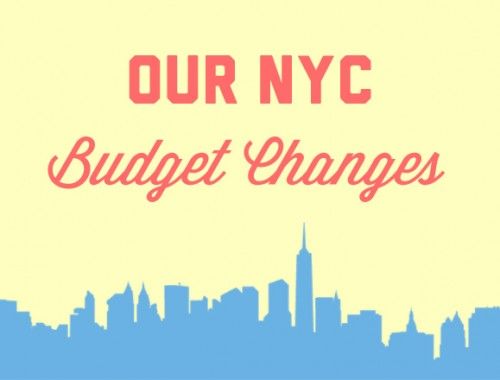In case you missed it on our Facebook page last week, there was a nice little write up on our clan, NYC budgeting ways, and OFB on Forbes.com. If you’re interested in checking it out, click your mouse right here.
After reading the article, we realized there’s a lot of nuance to budgeting and our budget in particular. From budgeting apps to tracking methods to our Everything Else category to backwards budgeting, there are countless ways to optimize and customize and hack a budget. And if you’ve been going at it successfully for some period of time, that’s a good way to make the most of your money.
But it’s also pretty complicated. What if you’ve never been able to stick to a budget? Or what if you just don’t get it? What if you’re just starting out? All those extra hacks and optimizations are just garbage. It’s fluff. So if you fall in this camp, or if you need a good reminder about what it is you’re doing every month, this short post is for you.
This is what a budget is made of:
- Projected income
- Projected expenses
- Actual income
- Actual expenses
The end. Seriously, that’s it. You’re estimating and setting goals for your money and then comparing that against what actually happens.
Seeing a budget for what it actually is might help you create your own system. The only “right way” to budget is the way that actually works for you. So get rid of all the preconceived ideas of what your budget needs to look like and how other people do it. Just take those four ingredients and figure out a method that works. There’s more than one way to skin a cat. (I could write a whole post about the troubling questions this idiom prompts [Why are you skinning a cat? Are you going to eat it? Is this common? Common enough for people to turn this into a common saying? Where do these people live? Is our cat safe? Where’s Persie?], but I’ll spare you.)
By the same token, if you’ve tried to keep a budget before but failed, it means you were struggling with one (or more) of these four things. Maybe you were projecting your expenses wrong. Or your actual income wasn’t enough to cover basic projected expenses. Or you weren’t able to stay up to date with your actual expenses. So while it’s easy to chalk it up to some elaborate reason, it really boils down to one of these basic components.
So let’s start there. Which of the four budgeting components is your greatest pitfall/struggle/roadblock/hurdle?





13 Comments
Congrats on the Forbes article!
When we were first trying things out with budgets as a married couple, our projected expenses were the hardest part. We had to step back and see where the money was actually going. Once we had that info, it became easier to direct our money to what we needed.
Not perfect, but we’re much happier with our budget. It allows us to have more time with the girls and less time worrying about money. A win in my book 🙂
Congrats on the Forbes article!
I would have to say the most difficult of the components for me is actual expenses, and I blame it on that old chestnut we call groceries. I start out the month strong, and within a week, my budget gets blown to smithereens with that ONE.STUPID.CATEGORY. Grrr!!
This is one category I have to constantly work on.
Our biggest issue is actual expenses (particularly actual expenses in areas like shopping, entertainment, and food)–my inability to say “no” to things as readily as I should, and my husband’s desire to make me happy and therefore never say no. Thankfully, our actual expenses never go beyond our actual income (we shift around budgets so underages cover overages), but I do see hundreds of dollars just slipping away on a monthly basis that should be going towards paying off debt.
I can foresee a complication here in the upcoming months. We are saving for my husband to go back to school, saving for a new to us vehicle, saving for a maybe-soon-to-come baby. Those savings are going to eat up our income to the tune of about $1500 a month, and with our debt expenditures already gobbling up 1/3 of our income, we are in need of a major mental overhaul. I know we are capable of dramatic savings–we did it when I needed surgery last year–I just don’t know if we are capable of sustaining that kind of lock-down on our finances for the next 3 years.
I really like the idea of tracking problems with budgeting back to one of these four categories. Thinking this way, my biggest problem is actual expenses. I can track them just fine, but sometimes I struggle to make them come in line with the budget!
Great Forbes article! Well done you!! It’s great reading your journey from another person’s perspective (if that even makes sense!), really reaffirms why you do what you do and you should be very proud of yourselves for the sacrifices you’ve made to achieve what you have! Me??? Projected expenses and actual expenses seem to have an all out brawl most of the time! I’m getting there but its still a struggle some months! I figure in about 12 months, apart from my mortgage, I will be completely debt free AND I CANNOT WAIT!!!! 🙂 🙂 🙂 🙂
For me, definitely “actual expenses” is where I fall flat. Bills and that sort of stuff is easy, because most of them I’ve got going as an annual or monthly payment and the payment is the same every time. It’s the extra bits, receipts and things that I have trouble keeping up with, between groceries, coffees, and chasing up the hubby. I think it’s probably a perceived problem more than anything else, as I don’t have a system for it, and haven’t made the effort to sit down and change it, because I’m not sure where to go with it.
So important to take a look at the variances. Budgeting is all about getting yourself “in the know” with your finances. Track your budget and actual, and compare where you’ve exceeded and where you fell short. It can be pretty eye opening when you see where you are spending well over your expectations and where you can buckle down and save.
Absolutely “actual expenses.” We can never nail down the perfect tracking system. Or maybe it’s “projected expenses” and struggling with choosing the right categories. Every month feels a little bit different, and when a perceived budget anomaly comes up, we’re track pretty quickly. Somehow we are still doing really well with the debt monster…that is the common goal and everything else in moderation, when we can.
Hi, been lurking here since your first post *awkward wave* but I had to comment today because I just realised why Persie is called Persie. Ha! Purr-sie. *even more awkward wave*
Projected income! I’m an hourly student employee so my paycheck is variable. I set my budget weekly to cover my basic expenses. When I work more during a pay period I adjust my budget and put money into savings and discretionary spending.
Congrats on the Forbes article!
I love how you broke down budgeting so simply. Even after budgeting for years, it can still feel overwhelming at times so it’s nice to look at it from such a clear definition. Lately we’ve actually had a hard time knowing how to handle extra income. I know it’s a nice problem to have, but I don’t want to feel like we made poor decisions later on. I always thought budgeting would get easier, but I feel like we have so many different directions we’re going these days. I actually miss the days when our goal was simply to spend as little as we could! I never thought I’d say that!
Great overview of what makes a budget. Sometimes people get so caught up in the details of budgeting that you often forget to look at the bigger picture like this. Thanks for sharing!
Awesome article in Forbes! My problem, month in and month out, is spending too much in the fun category. I basically never stay within that budget and never restrict myself enough to stay within it…. Hopefully admitting it is half the struggle 🙂